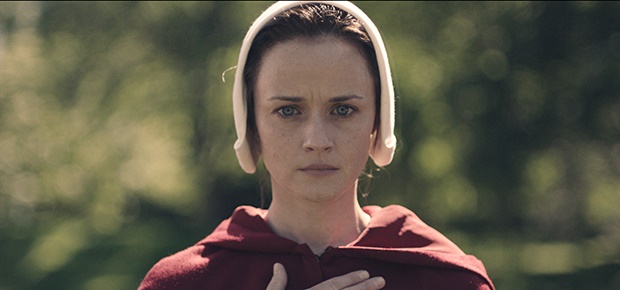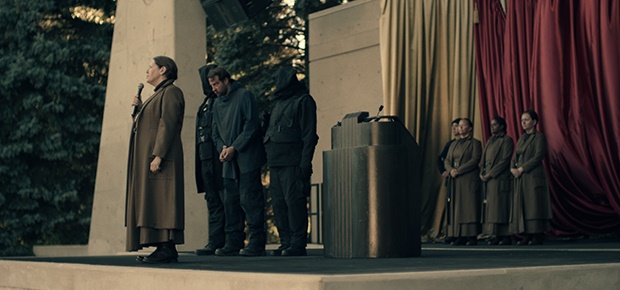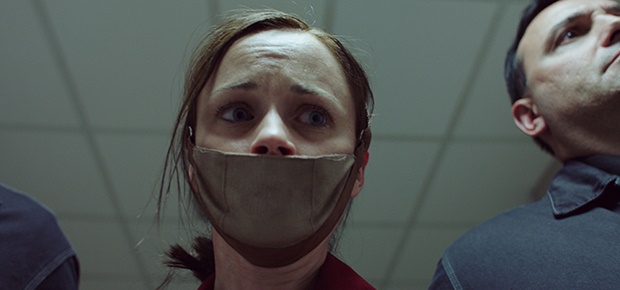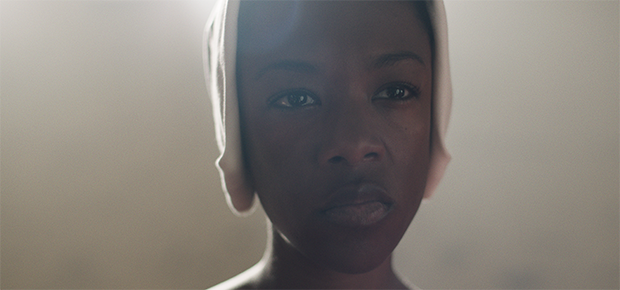
“We were the people who were not in the papers. We lived in the blank white spaces at the edges of print. It gave us more freedom. We lived in the gaps between the stories.” – Margaret Atwood, The Handmaid’s Tale, 1985.
The TV series based on Atwood’s groundbreaking dystopian novel premiered in the USA in April 2016, after the historic Women’s March and with Donald Trump as President. It came at a time when women in the USA felt that their human rights were under attack, that all the progress and freedom that they had achieved was in the process of being dismantled.
Because the series deals with an extreme example of the oppression of women in a dystopian version of the States, it felt prescient to a lot of people watching, and went on to win big awards and critical acclaim. It didn’t hurt that it’s beautifully shot, brilliantly acted and completely addictive in all its horror.
It’s set in Gilead, a totalitarian society facing environmental disasters and a drastically declining birth rate. As a way to populate the country, fertile young women are forced to bear children for high-ranking government officials and their wives. The Handmaid’s Tale tells the story of one of these women, Offred (Elisabeth Moss), as she tries to sabotage the regime using the little power she has.
It’s based on real-life events
Atwood, who is Canadian, lived in Iran for a time. She commented in the New York Times that the book was based in part on real-life events in Iran and Czechoslovakia as a response to people saying “It could never happen here.”
It’s a worldwide warning to women that, in fact, this kind of devastating regime change could happen anywhere, right underneath our noses, without us even realising.
Why should South Africans watch it?
We may have a forward-thinking Constitution that values women’s choice over their bodies. We may have access to contraception and feminine hygiene products, legal abortions and same-sex marriage as well as the legal protection of LGBT community. But we also live in a society that’s rife with stereotypes and stigma attached to these issues.
And that’s not the only reason The Handmaid’s Tale is especially relevant to South African women.
The past: apartheid
As Zanele Kumalo, the editor of W24, noted, there are striking similarities between Gilead and apartheid South Africa.
“Regimes change globally as they do in the series. The same happened in SA, particularly during apartheid, where black women had to leave their homes and families and work in other people’s homes servicing their employers’ families. They might not have had to bear children for their employers, but they certainly had to raise them. The sense of loss, and loss of control, shown in the series will be poignant.”
The present: domestic violence
As South African Twitter user @kez_dnt_care said, “Because the role of a woman in many parts/cultures in this country are still only based on their ability to give birth and serve the patriarchy, women are not recognised as individuals. This is dehumanising and contributes to the violence.”
We may have a liberal Constitution, but the violence in the country has made many women feel imprisoned, with no choice but to stay with their abusers, which is not all that different to Offred’s position in The Handmaid’s Tale.
The future: beware
Twitter user @SuvaniaS wrote about oppression that is introduced little by little: “I think women in SA should definitely see it because it highlights the ‘little’ horrors women endure every day and shrug off as ‘normal’, when, in fact, it is horrifying and shouldn’t be normalised, things like being controlled by religious bodies and reproductive choices.”
As The Handmaid’s Tale reminds us, what happens in Gilead could happen anywhere, at any time. And so, while we continue to fight for truly equal rights in SA, breaking the stigma of abortion to end dangerous illegal operations, striving to get paternity leave recognised as important so that both fathers and mothers can play equal roles in raising their children, and creating safe spaces for women to report abuse and seek support, let’s also make sure that we never ignore the “little horrors”.
Watch the Emmy- and Golden Globe-winning The Handmaid’s Tale on Showmax now, as well as plenty of other excellent series and movies. Sign up for Showmax today and get a 14-day FREE trial. And if you’re a DSTV Premium subscriber, get Showmax at no extra cost. Find out how here.




 Publications
Publications
 Partners
Partners


















